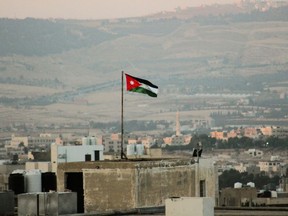Henry Srebrnik: Jordan caught in crossfire between Iran and Israel
Stability of country is of concern in the region

Article content
On April 13, Iran launched a massive aerial attack against Israel. Britain and the United States helped Israel defend itself against the attack, but so did some Arab states, among them Saudi Arabia and the United Arab Emirates, who forwarded intelligence about Iran’s plans.
As well, Oman declared it was crucial to reach an immediate cease-fire in the war between Israel and Hamas. And Kuwait “stressed the necessity of addressing root causes” of the region’s conflicts.
However, the attack caused major problems for the Hashemite Kingdom of Jordan, which lay in the path of the Iranian barrage and so found itself shooting down Iranian missiles – and then being accused of defending Israel. Jordan also reportedly opened its airspace to Israeli jet fighters. One internet meme on X, formerly Twitter, showed King Abdullah II in an Israeli general’s uniform.
A former Jordanian information minister, Samih al-Maaytah, defended the decision.
“Jordan’s duty is to protect its lands and citizens,” he maintained. What Jordan did “was to simply protect its airspace.” He added that “Jordan’s position on this conflict is that it is between two parties over influence and interests: Iran and Israel.”
But a regional conflagration will be “bringing vulnerable allies like Jordan to a most unwelcome position between a rock and a hard place,” contends Tuqa Nusairat, an analyst at the Atlantic Council’s Rafik Hariri Center for the Middle East.
Even before this development, Jordan has been rocked by anti-Israeli sentiments. Against the backdrop of the war in Gaza, around 150,000 Jordanians, mostly of Palestinian origin, have been participating in angry demonstrations outside the Israeli embassy in the capital city of Amman since March 25. They have been organized by the National Forum for Supporting the Resistance and spearheaded by the Muslim Brotherhood.
There have been calls to annul the peace treaty that was signed between Israel and the late King Hussein in October 1994, alongside calls to end all aspects of normalization between the two countries. The Jordanian movement to boycott Israel has also been revived and is now focused on opposing the export of Jordanian vegetables to Israel, revoking gas and energy agreements, and closing the land border between the two countries to the transfer of goods.
During the demonstrations, there have been calls from the “resistance” to take up arms, cross the border and help liberate Palestine, not only in the Gaza Strip but also in the West Bank. King Abdullah allowed the protestors to express their solidarity with the Palestinians in Gaza, expecting these protests would last only a few days before dying down. But they grew in intensity, and there were more calls for armed resistance and a popular intifada. Some protestors even attempted to break into the Israeli embassy and set it ablaze.
Any threat to Jordan’s stability would be an opportunity for the Iranian-led axis of resistance to interfere in the kingdom’s affairs and open up an additional front against Israel. The extent of Iran’s growing involvement in the Hashemite Kingdom is gradually being revealed, from smuggling arms, fighters, and money to disseminating its radical ideology. Iranian media reported Hezbollah is ready to arm 12,000 “resistance” fighters to overthrow the monarchy.
One of the pillars of Iran’s long-term strategy to destroy Israel has been to encircle and strangle the state, using proxies in Iraq, Lebanon, Syria, and Yemen. Iran’s next victim might be Jordan. The country hosts millions of refugees and its disgruntled populace suffers from high unemployment. It sits strategically to the east of Israel and the West Bank.
So how would Iran destabilize Jordan to set the stage for a pro-Iranian regime or set up proxies to dominate the country? Since Abdullah has control of his parliament and loyalty from his professional military, who are Bedouins, not Palestinians, the most likely scenario would be a ground-up approach, targeting Jordan’s vulnerable population. They would cultivate support among the poor, Islamists, the disgruntled majority of Palestinians, and the millions of displaced refugees from the Syrian and Iraqi wars.
Jordan has long offered a softer form of autocracy than states along its borders. But the country of 11 million has been increasingly roiled by internal tension, including rumours that King Abdullah had amassed vast offshore assets. Jordan’s government has taken steps to rein in free expression, including the passage of new cybercrime legislation that could be used against critics of the monarchy.
The stability of Jordan is of concern in the region. Crown Prince Mohammed bin Salman, the de facto ruler of Saudi Arabia, spoke with King Abdullah about these developments, stressing his country supports Jordan’s efforts to safeguard security and stability in the kingdom. Abdullah was even urged to annul the citizenship of some of the three million Palestinians living in Jordan who support Hamas and the Muslim Brotherhood.
Nearly 30 years since the peace accord between Israel and Jordan was signed, the Jordanian public remains steadfast in its opposition to the Israeli occupation of the West Bank, as well as to peace and normalization with Israel. The possibility of instability in Jordan, leading Iran and its proxies to deploy forces along the Israel-Jordan border – Israel’s longest border – should be enough to keep Israel’s leadership awake at night.
Henry Srebrnik is a professor of political science at the University of Prince Edward Island











Postmedia is committed to maintaining a lively but civil forum for discussion. Please keep comments relevant and respectful. Comments may take up to an hour to appear on the site. You will receive an email if there is a reply to your comment, an update to a thread you follow or if a user you follow comments. Visit our Community Guidelines for more information.